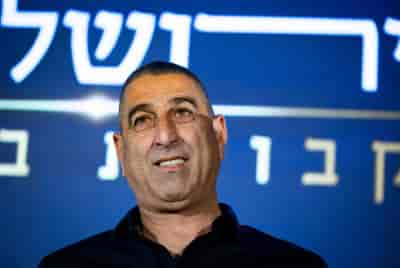Israel-Gaza War, Heroes
Not all heroes wear capes: The extraordinary heroism of Rami Davidian
Farmer Rami Davidian's unyielding bravery: How one man's heroic actions saved hundreds during the October 7 Hamas attack.



Rami Davidian, a 59-year-old farmer from Moshav Patish near the Gaza Strip, had never served in a combat unit, yet his quiet determination, extraordinary courage, quick thinking and ingenuity allowed him to save as many as 700 innocent young people during a horrific attack by Hamas terrorists.
After receiving a distress call early in the morning, Davidian, unarmed, set out on a rescue mission. He was unaware of the full scale of the assault, encountering fleeing party-goers who had taken refuge in the orchards and groves. He picked them up and then, with the help of other volunteers, they quickly established a makeshift situation room, coordinating efforts to drive participants to safety.
Davidian repeatedly drove into life-threatening situations, dodging Hamas bullets to locate and rescue shocked revelers hiding in ditches, behind trees, and anywhere they could find cover. At one point, Davidian even posed as a Yemeni Muslim to bargain for the life of Amit Parizer, a young Jewish Israeli. Davidian's knowledge of the local terrain and his fearless determination were crucial in rescuing around 700 individuals from the clutches of the terrorists.
Once there were no more people left to save, Davidian returned to the festival site. Amid the smoke and gunfire, he encountered the gruesome aftermath of the attack. He meticulously gathered body parts, covered corpses that lay in indecent positions, and moved bodies away from the paths of advancing Israeli tanks. Over each fallen individual, he recited the traditional Shema prayer, honoring their memory with dignity and respect.
In recognition of his extraordinary bravery, Davidian was chosen to light a torch at the national Independence Day ceremony on Mount Herzl. His story, along with those of other ordinary citizens who displayed superhuman capabilities on October 7, is featured in a new book by Nachum Avniel titled "We’re On Our Way: The Civilians Who Saved Lives On October 7."
Davidian is still suffering from what he encountered that day. As reported by JPost, he recently said, "These memories that I have cannot be forgotten since they are etched into my heart, [they] will remain with me for the rest of my life. ... what I saw there, you don’t see every day. To witness naked teens tied to trees is something that I’ll never be able to forget. It will remain with me for the rest of my life. I have sought therapy with psychologists and psychiatrists to learn how to cope with this."
He says that he has a hard time sleeping and that he also can’t look at meat because "if I see meat in a restaurant or in a store, I remember the [images of the] outdoor bomb shelters."
Davidian’s narrative adds a deeply personal dimension to the collective memory of that day, highlighting the emotional and psychological toll on those who faced the horrors firsthand.
As Israel honors its heroes, the story of Rami Davidian will be remembered as a testament to the indomitable spirit and unwavering resolve of the Israeli people.
Join our newsletter to receive updates on new articles and exclusive content.
We respect your privacy and will never share your information.
Stay Connected With Us
Follow our social channels for breaking news, exclusive content, and real-time updates.
WhatsApp Updates
Join our news group for instant updates
Follow on X (Twitter)
@JFeedIsraelNews
Never miss a story - follow us on your preferred platform!